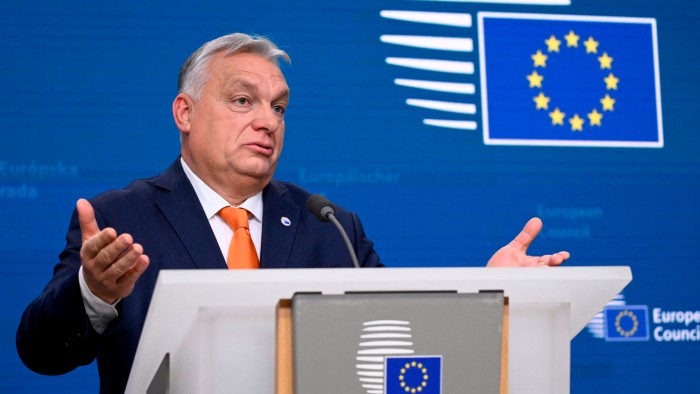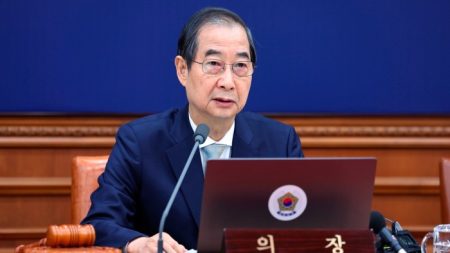Unlock the Editor’s Digest for free
Roula Khalaf, Editor of the FT, selects her favourite stories in this weekly newsletter.
Hungary is set to permanently lose access to just over €1bn in EU funds on January 1, as disputes between Budapest and Brussels hamper the country’s capacity to drag itself out of recession — and undermine Prime Minister Viktor Orbán’s bid for re-election in 2026.
The freeze on EU funds has hit Hungary at a time when its government has little room for manoeuvre. Its budget deficit this year stands at more than 4.5 per cent of GDP, increasing political tensions.
Hungary’s economy shrank by 0.7 per cent in the third quarter — the second contraction in a row — plunging the economy into a technical recession amid weak demand in the automotive, electronics and pharmaceutical sectors that dominate its manufacturing base.
Of the €6.3bn in funds frozen by Brussels over concerns about the rule of law, Budapest will permanently lose €1.04bn because this amount must be allocated by the end of 2024 or it expires. Hungary is also missing out on €1mn per day in funding from the EU over its illegal treatment of asylum seekers; its total losses over the treatment of asylum seekers will amount to €200mn by the year’s end.
Both come on top of a one-off €200mn fine imposed by the European Court of Justice in June over breaching asylum rules and ignoring an earlier judgment.
In total, €19bn in post-pandemic recovery funds and other EU resources remain blocked.
János Bóka, EU affairs minister for Hungary, said in mid-December that it was “very difficult” not to interpret the withdrawal of funds as “political pressuring”, adding that Budapest would take action to “remedy this discriminatory situation”.
The government is also seeking compensation for the ECJ’s June ruling that led to the multimillion-euro fines, in another sign that relations between Brussels and Budapest have reached a new low.
The Hungarian opposition has seized the opportunity to blame Orbán’s government for the economic malaise.
Péter Magyar, an Orbán ally turned foe whose party caught up with Orbán’s Fidesz in EU elections in June and has since come to lead opinion polls, said: “You have had 14 years with unlimited power and billions in EU funds . . . This ship has sailed. Hungarians won’t wait. Enough is enough!”
EU money is likely to remain blocked all the way until the elections, with neither side willing to let up on what each considers to be fundamental issues, including anti-corruption measures, judicial independence, and Hungary’s treatment of minorities and asylum seekers.
Brussels has also questioned Budapest’s belief that it can raise spending over the course of the next four years, based on Hungary’s expectations of stellar growth.
The two sides have until mid-January to agree on a compromise fiscal plan between 2025 and 2028, with the EU set to give the country bad marks unless the government lowers spending.
“There will be a lot of tug of war,” said Péter Virovácz, ING’s senior economist for Hungary.
For the 2025 budget, billions of euros worth of mostly EU-funded investments and social spending have been cancelled, prompting Magyar to tour the country, calling attention to crumbling hospitals, inadequate childcare facilities and railway stations that have been left to the elements for decades.
Economy minister Márton Nagy has acknowledged that the government cannot entirely plug the gap left by EU funding.
“You can’t just say you want a shiny new hospital, you need money. For that you need growth,” Nagy told the Financial Times. “The economy needs to be fixed first . . . for years we have stumbled from crisis to crisis, Covid, energy crisis, war, now the weakness of the German economy . . . We all know tax revenues are missing so we need to recreate those.”
Nagy has insisted the government will not overspend, saying he will limit the use of funds to boost growth to 0.5 per cent of GDP.
Instead of using government funds for stimulus, the economy minister has proposed enabling people to use about €5bn worth of private pension fund savings for real estate purchases or renovations tax-free, in a move aimed at boosting weak demand.
Orbán, meanwhile, is betting that investors from Asia might fill the gap — a policy that he dubbed “economic neutrality”.
Chinese investment in Hungary has surged in recent years, but few think it can entirely compensate for a lack of funds from Brussels.
Before the spats between Brussels and Budapest intensified in 2022, the EU was ready to fund several big infrastructure projects in Hungary.
Those included a railway link from the centre of Budapest to the capital’s airport.
“We could have had a golden age, with more than €10bn spent on the sector in this decade alone,” said Dávid Vitézy, who led the Budapest transport authority at that time, and later briefly served as Orbán’s state secretary for transport. “We have lost nearly all of that.”
“EU funding is an important part of a public investment in Hungary,” EU economy commissioner Valdis Dombrovskis told the FT in an interview in December, adding that “it’s important that obviously Hungary does what is necessary to ensure the availability of the funding”.
Read the full article here













